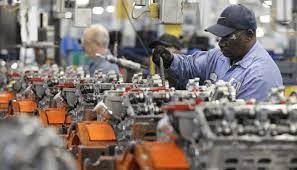By Godfrey Ofurum
-
Decry inadequate power, insecurity, multiple taxation, others
A long drawn out foreign exchange crunch in Nigeria has forced local manufacturers to request a special access window to foreign currencies to enable them import raw materials and machinery for their operations. The real sector operators requested the Central Bank of Nigeria (CBN) to allow them to get foreign exchange at official rates for raw materials that are not readily available in the country.

For instance, the textile industry, which used to be one of the highest employers of labour in the country is now comatose, as most of the firms have shut down production, due to high production cost.
John Udeagbala, national president, Nigerian Association of Chambers of Commerce, Industry, Mines and Agriculture (NACCIMA) noted that insecurity has become endemic and that the lack of good road network, which makes it impossible for businesses to deliver goods and services, has compounded the challenges faced by business operators in the country.
He observed that the government does not have enough money to finance capital projects, because of its commitment to petroleum subsidy payment to private petroleum importers.
“At the moment our budget for capital expenditure is nothing. It is either we fix our refineries, otherwise we would continue to repeat these stories and we are tired of repeating them.
“It has been NACCIMA’s stand that the federal government should remove [the] subsidy on oil.
“Subsidy payment is infested with corruption. And [the] majority of Nigerians are not benefiting from it. We use 26 percent of our crude oil export to import fuel, so this is the origin of our problem,” he observed.
Ijeoma Oduonye, chief executive officer, Cutix plc, electrical cable manufacturers based in Nnewi, Anambra State, stated that indigenous Nigerian companies are facing serious operational challenges.
According to her, it is turbulent and characterised with a number of challenges, adding that Cutix was getting its own share of it.
“One of [them] is the scarcity of forex, particularly the dollar. For my industry, I will say a significant quantity of our raw materials, some are locally available, but we import others and we need the forex to do this. It is a herculean task getting forex for our importation.
“The experience is that we buy from the parallel market and the price is not constant, it fluctuates. You may get it at N620 to a dollar today and when you come back the next day, they will tell you that it has risen to N700 per dollar.
“Of course, the CBN is going to give me this money much below, at N400 or a little above that, but the problem now is that we don’t get it, so if you are lucky it takes a minimum of 10 weeks to fund one pro-forma invoice, because every week you apply.
She continued, “What happens is that you get your pro-forma invoice, you take it to CBN and get your approval, and you want to access may be about $3000 for the purchase of your materials, so every time they go for a bid, which is done every other week, you get a minimum of 10 percent of your requirement. So, if you want $3000 you are given 10 percent, every time you come. Sometimes, they give you below, sometimes they don’t give anything at all, as we are talking now I have some transactions I started funding from 2020.
“For me to get at government rate, and this transaction has not been fully funded, because this piece meal issuance of forex is making a mess of the whole thing, and too, what is happening in the world now (the supplier effect), we are reviewing our price upward. Even before you get the materials your price is already increased by some percentage and some others, cancelled outrightly.
“It is affecting our business adversely, because for you to remain in business, you have to watch carefully, when the supplier abroad reviews prices, you also do the same. You are hearing the sound of my generating sets, diesel prices have increased by more than 100 percent, you have to touch your own price, and generally the purchasing power now is something else. Whether we like it or not, it is affecting businesses,” she lamented.
Ebele Enuwa, managing director/chief executive officer, Sundry Foods, a fast growing Nigerian conglomerate with special interest in restaurant, retail and other agro-value chain services, blamed the harsh business environment on bad leadership and policies.
He observed that with the right people making the right decisions at the right times that the country would solve some of these problems bedevilling the sector.
According to him, the era of choosing people to lead on the basis of sentiments must stop.
“I’m hoping it will come to an end. We’re seeing an awakening of people, deciding that things must be done differently. I’m however surprisingly still seeing some people wanting to continue to do things the same way. I’m hoping that the number of people who want to do things differently is more than the people who want to do things the same way, because the same way cannot work.
“We need to get the best and brightest minds at the positions that make decisions, because it impacts on all of us, as a country and until that happens, we will continue to suffer,” said Enuwa.
Continuing, he said: “One of the things you will notice and, of course you will, agree with me, is that we have brilliant minds in the private sector. We also need a critical mass of brilliant minds in the public sector and if that happens, Nigeria will be able to achieve its full potential.”
To ensure the survival of Nigeria’s real sector and especially in the Southeast/Southsouth regions, stakeholders urged the federal government to ensure speedy rehabilitation of the country’s refineries to end scarcity of petroleum products in Nigeria, harmonise taxes and ensure constant power supply in the country, especially in industrial areas.








